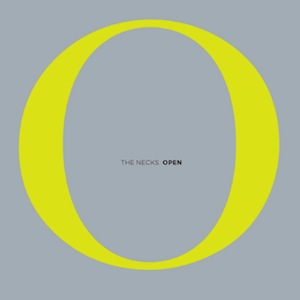I’m intensely relieved that I don’t have to assign a score for this record in reviewing it here; beyond any vague, wider-pitched concerns about reducing any work of art to a numerical judgement, specifically, in this case, it makes no sense at all. I cannot judge this record against the criteria of useful for judging other records, except, possibly, for other records by The Necks.
If you don’t know The Necks, here is some context. They are an Australian three-piece band, nominally playing jazz, who have been together for the best part of 30 years, and who produce elongated, quasi-ambient, fearlessly experimental (in the literal sense) music. Most of their umpteen albums consist of a single, hour-long track, sometimes completely live and improvised, sometimes edited and mixed so much that it feels like a post-partum composition, a la In A Silent Way, if you like.
Their music is like the beautiful, vatic, aqueous moments that happen between other people’s songs, the moments and interludes and fades and drifts that I always wish would last longer, would last forever, would consume the actual songs around them. They could not have existed before the CD age. They are, to put it simply, magnificent and unique.
Live, The Necks play the room they’re in as much as the instruments they’re sitting at (which are usually piano, bass, and drums), testing the harmonics and exploring how to extrapolate curlicues of sound that they themselves do not actually make, but rather coax out of the fabric of the building. It sounds faintly deranged and very pretentious, but I’ve seen them do it, and it’s a bizarre, psychedelic thing to experience.
In the studio they play with overdubs and mixing. Drive By is perhaps their studio masterpiece, almost countless layers of hour-long overdubs – piano, organ, recordings of crepuscular insects or distant playgrounds, drums, bass – mixed together to create a seamless, ever-shifting groove that alters on microscopic levels, that feels like one organic piece, intertwined and alive, rather than the result of meticulous consideration, editing, and studio craft.
Open is very definitely a studio record rather than a live document. To be reductive, it feels like an amalgam of previous albums Silverwater, which changes and twists through various discrete phases rather than repeat-repeat-repeating with minute variances, and Aether, their ruminative, ambient masterpiece, as minimal and repetitive as Basinski’s Disintegration Loops but somehow more alive, unburdened by the weight of association. It starts with tremulous reverberation, which gives way to chiming percussion and meandering, somnolent piano.
But merely describing what happens, timetabling changes for listeners to keep an ear out for, seems a reductive approach to ‘reviewing’ Open. It starts; it evolves; it changes; it ends. On numerous occasions it threatens to break into the kind of kinetic, linear pulse that The Necks have used before on Hanging Gardens or parts of Chemist, but it never actually does. One could find oneself longing for the resolution of nascent melodic or rhythmic patterns, for acquiescence to rock orthodoxy perhaps and a moment of gratification, but the whole point of The Necks is that it is better to travel hopefully than it is to arrive.
In some ways Open feels like a direct reaction to the band’s previous album, Mindset, which combined two 22-minute compositions and was the first Necks album to be released on LP; the first that could be released on LP. Open is much more easily beautiful than Mindset, which was a touch combative, as if it didn’t like being on vinyl. Space is as important a component as anything else in the mix. At times it feels as if nothing, literally nothing, is happening. But it is, constantly.
It would be easy to tie yourself up in philosophical knots about this band and what they do – is it important, is it boundary pushing, is it influential, is it relevant – but none of that matters. Just put this recording on. Listen to it. Let it inhabit the same space as you. Let it influence the colour and tone of the room you are in, let it change your mood and perception. Leave the room, make a cup of tea, come back, read a book, make love, write a letter; it will have changed; it will have stayed the same.
Even by The Necks’ standards, Open feels intensely pure; drummer Tony Buck said in a Guardian interview a decade ago "I really, really love playing the drums. I’ve been doing it for more than 30 years and I enjoy it more than I ever did." It’s more than 40 years now, and that love doesn’t seem to have diminished one iota; there is great love for music, for sound, for expression, right through the heart of this record, in Lloyd Swanton’s bass and Chris Abraham’s piano, in the movements they make together, the sound they produce. Open is magical, calming, intriguing, beautiful. It makes me smile to listen to it.


